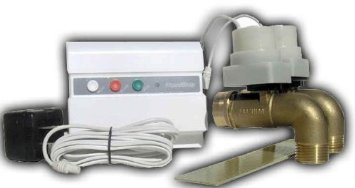Preventing a washing machine flood in your house
This post was inspired by a conversation today with some co-workers about the fact that rubber washing machine hoses eventually fail, and what happens next is up to you. A few years ago, when I was getting a new home owner's policy I read about what causes the biggest losses (and problems) for homeowners.
Turns out water has a lot to do with it. Rubber washing machine hoses don't last forever. They are under high pressure and the solenoids open and shut dozens of times during a cycle. Cheap rubber hoses (the kind Sears uses when they install your washer) that cost a few dollars can fail if not replaced every few years. A safe number I heard was 5 years.
Well if you are like me, and live in a newer multi-story home, changes are you have a washer on your second floor. It's an incredible convenience if you have kids. Anyways the thought of a hose bursting on the second floor made me nervous.
I learned of these devices that you can purchase that have a water sensor and can then shut off the water supply and notify you via an audible alarm. I purchased and installed one of these Floodstop Washing Machine Valve Shutoff Kits a few years ago. It's been working great. One day some water got behind the washer and the Flood Stop worked flawlessly.
You should probably also invest in good quality hoses.
If this isn't enough protection for you, then you might also want to protect the washing machine discharge from flooding. You can do this by getting a Furman Power Relay and cut off power to the washer, thus shutting off the drain discharge when a leak is detected.

